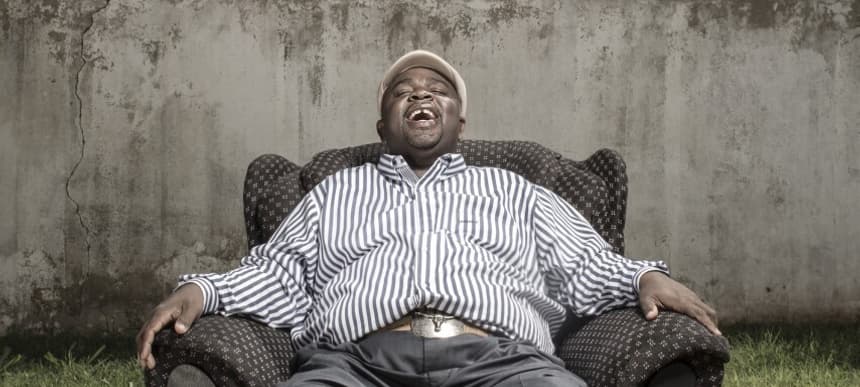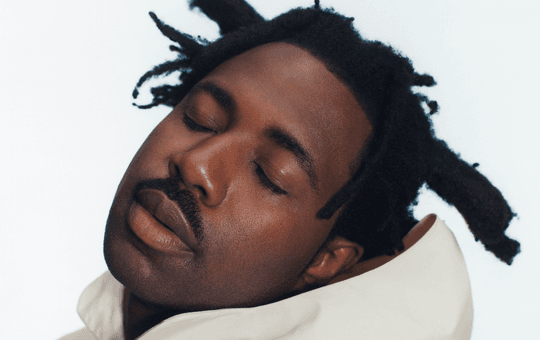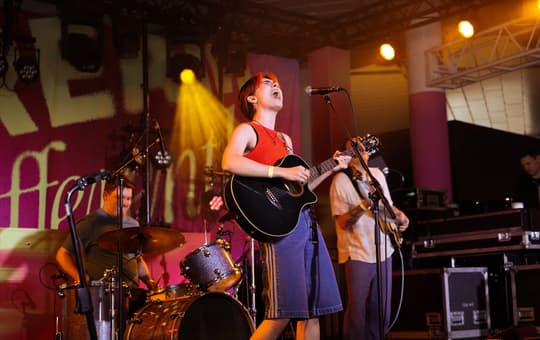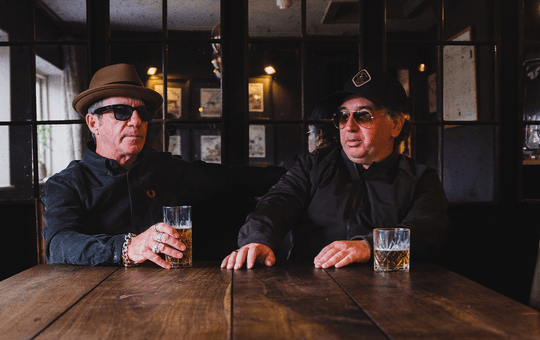
Nozinja interview: "All the nation dances. It’s a matter of growing with that."
When I meet him on a rainy Tuesday afternoon, Richard 'Nozinja' Mthetwa’s trademark tasselled costume is covered by a puffer jacket, and he’s brandishing an umbrella, ready for his photoshoot with Tessela (the two have been working on music together). Seeing him standing still for a photo feels completely at odds with the incredible amount of energy he generates, both musically and physically, during a live performance. When we talk later, he emphasises that the Shangaan music and movement are closely connected, describing them as ‘best friends’. "It’s the Shangaan way," he says. More often than not, Nozinja’s live performances are flanked by dancers recruited from his home town, demonstrating the ‘no bones’ moves that Shangaan dancers have become famous for.
The word Shangaan refers specifically to a group of South African people who have come into cultural prominence in latter years through the spread of their music and dancing. Taking the traditional folk sound of the Shangaan nation, Nozinja created his own interpretation of the music he heard as a child growing up in South Africa, staking a claim as leader of the Shangaan Electro movement. Starting his own label and releasing 25 albums over the course of the last 10 years, Nozinja has been at the forefront of the genre's rapid global expansion, helping it find a place far above and beyond its original folk roots in South Africa. Its emergence can be part-credited to the 2010 Honest Jon’s compilation 'Shangaan Electro – New Wave Dance Music from South Africa', the frenetic beats quickly finding themselves a home in the UK. Most immediately notable for its speed, people come for the super-fast BPM and stay for the visual spectacle and incredible urge to dance that the music provokes.
Now singed to Warp, we spoke about learning to dance, what an older generation thinks of his music, and how he mixes his art and his business.
I thought we could start out by talking about the more traditional folk roots of your music, and how it’s tied in with the Shangaan people.
Nozinja: "Shangaan music comes from the traditional music. Old, old traditional music. Very old. I won’t even tell, because my grandmother will tell you it’s old. It goes like that, but I found it like that. When I was growing up, that’s the music we listened to. As much as the children growing up now, they’re listening to our music. Obviously when they grow, they’ll change it to something else, and then they’ll see our music as old. They’re bound to do that."
Has the dancing always been a part of the music?
Nozinja: "They are friends. They are best friends. I was one of those people dancing to that music."
Who taught you?
Nozinja: "You don’t get taught, you just sit and then you go with the flow. Because if you were taught, that would be… That person to teach you would be a multi-millionaire, because all the nation just dances. It’s a matter of us growing with that beat; it’s in you. You force yourself as a kid playing around until you get it right."
It’s part of the culture. And you’ve taken it, and given it your own twist.
Nozinja: "We are the new generation now. We live in the 21st century. Things change, every music has to change. We have to play something that’s in the now, the present. So, for me, it was very easy to change to something else, but to be honest I didn’t know where it would take me. But I had this ambition that it would be big."
"All the nation dances. It’s a matter of us growing with that beat; it’s in you. You force yourself as a kid playing around until you get it right." – Nozinja
What do your parents, or an older generation, think about the music you’re making?
Nozinja: "Obviously they will never be happy. They say, 'Why are you changing our style?' They prefer whatever they prefer, but a new generation wants something new. It’s their style. They grew up with that, that’s their life. We’ve got our own life to live, but we have to do something that we can claim to be ours. They claim that music as theirs, we must get something that we can tell our kids 'this is ours’. So we were bound to break some rules there. They were not happy, I can tell you now. But when they see us dancing, and they see their grandchildren dancing, they start laughing and saying it’s good anyway. That’s what is more important."
What for you is the soul of the music. What charecterises it?
Nozinja: "The message, there’s a lot of messages in that music that we sing about. You sing about happiness, you sing about soul, you sing about dancing, and gospel sometimes. It’s got a lot of things in it, but I prioritise dancing. Soul is one thing that that once you keep, you will never grow old. You will stay being soulful throughout your life."
You said people at home prefer their own style. Now that it’s growing in popularity and people round the world are listening, has that changed how they feel? Are they happy to see it spread?
Nozinja: "Oh very happy, very happy. Even though they didn’t believe it at first, but when they see it and they go to the internet, they Google and they see, they become so very happy to see one of their own making it big throughout the world. Or making it, not big, per se, but going to be big and making it in the world with different genres of music. That makes them happy. We are claiming it as ours; no one will come and say ‘this is our style’."
You’ve been performing round Europe and the UK, how have people reacted?
Nozinja: "It’s funny, you finish and then you want to close the stage, but people go on screaming, 'Please, one more song for us!' It makes me happy, very very happy."
What is it do you think has resonated with people that music is lacking here?
Nozinja: "There’s one thing I always tell people: we feel with the ears, we feel with the eyes, we feel with the mouth, and the nose. See, when the nose gets a funny smell, you pick it up very quickly. And when the mouth keeps on eating the same thing, you end up not feeling the taste anymore. And the ears are like that, too – they keep on listening to the same beat, the same style, but when they hear something new, the ears say, 'Oh wow, this is good for my ears.' Then they open up and everyone gets happy. People, I think, are happy to hear something new that they’ve never heard before, that makes them excited and makes them groove."
And also, it’s the dancing.
Nozinja: "Oh, you can say that, the electrifying part of it."
"When the nose gets a funny smell, you pick it up very quickly. And when the mouth keeps on eating the same thing, you end up not feeling the taste anymore. And the ears are like that, too – they keep on listening to the same beat, the same style, but when they hear something new, the ears say, 'Oh wow, this is good for my ears.' People are happy to hear something new that they’ve never heard before." – Nozinja
Is performing with dancers a different experience?
Nozinja: "You can’t perform this without dancers. Well, I think you can, but it’s a bit difficult for you to go on, because every beat’s got its own style that we created on our own on a choreographic part. It’s going to be difficult without dancers."
How much do you work with the dancers?
Nozinja: "We work. I will do my own thing, fill up the beats and give to them, and by listening to it they will create the style."
Where do you find them?
Nozinja: "Dancers are all over our tribe, which is Shangaan. Everybody is a dancer, but you must choose the best. When I go to parties I will look and I’ll tell you by the time they move that they’re a good dancer. It’s how you go with the beat, how you change with the music. And how you change some styles, to make a good choreographic part of it on your own."
You’ve been releasing music for 10 years and you’ve put out 25 albums. And you also used to run a mobile phone shop and you run a hotel with your wife. How is there time for everything?
Nozinja: "It’s a lot. Now I’m running a hotel with my wife. I think the hotel makes my wife very busy, and that’s good for me – keeps her going, so I can do my thing."
So you’re quite a businessman? It’s a balance between art and business?
Nozinja: "I’m too much of a businessman, I even take my music like a business. It’s because I always say you are very lucky to have both. Because you know how to use that last penny that you’ve got. Anything that you make, you invest it in the right place, because musically, you cannot play your music until you are 60 years old. You have to invest so that after 60 years, you can sustain your lifestyle. So that’s what I do. I always say the hotel is my retirement, I’ll retire to the hotel."
You’ve also done dance workshops, is that part of it too?
Nozinja: "I think that’s very good, because a lot of people want to know how to dance Shangaan. It becomes a very good introduction for people. I was speaking to my agent and saying we need to do more of those workshops. We do a workshop, then about 11 or 12 we’re done, we have a break, and in the evening we play. It’s good because you leave a legacy in that part of the world that you are. If I’m going to perform in London a few people come to the workshop, go back with something, and always come so the show and they start enjoying the show."
Do people try and dance at shows?
Nozinja: "They always do. I’ve got a lot of friends that I keep on the social network that dance in the traditional uniform that we wear. People are very good. There was a young kid – actually, it was here in London – who came with their parent. When she start moving I said, 'No, something’s not right, where does she get this?' And the father said, 'The only time we want to make her happy we must play the video. She knows each and every style.' I think she was four or five."
Do you have a responsibility to share this message and style?
Nozinja: "Very much, yes. If I could, I would do it on every show that I do – I would do a workshop."
I know the Shangaan people were displaced from their home and moved somewhere else. When you have that kind of background, it must be more gratifying to have success?
Nozinja: "It is, but once you start living in the past you aren’t going anywhere. You’ll keep on going back and back and it’ll take you backwards. Just say, 'Okay, fine, I’m here, this is my home now, let’s make the best out of it.' I’m not good in politics. Let the politicians do whatever they do, and let me do my bit."
In the past you tried to put releases out with some of the South African major labels, but they weren’t interested…
Nozinja: "None of the South African major labels took our music seriously, and then I decided to do my own label, because as I told you, I’m a businessman by nature. I thought I could do it. So I went and did my own and beat them at their own game – no one touched me. And by the time they wanted me to go to them, I said, 'No you can’t afford me and you can’t afford to do what I’m doing. Because you want to kill my music now. I would rather fight with you. You threw me like a wet tissue paper outside, and I told you this would be the future, and you refused. I’m not coming. Let’s be enemies – I will come with my good music, you come with yours. Let’s see who’s going to be the best.' And I won, and I’m happy about it."
So you would never work with a major now?
Nozinja: "No. In South Africa I’m on my own, and here I’ve got my parent now, which is Warp."
"None of the South African major labels took our music seriously. I decided to do my own label, because I’m a businessman by nature. I thought I could do it. So I went and did my own and beat them at their own game – no one touched me. By the time they wanted me to go to them, I said, 'No you can’t afford me and you can’t afford to do what I’m doing.' I won, and I’m happy about it." – Nozinja
Let’s talk about Warp. What made you want to work with them?
Nozinja: "When I started, my first release was with Honest Jon’s. And then I spoke to them, and I kept on sending emails to them, asking if we could do something. There was no response, and then my agent said let’s go for it. He did all this running up and down to get me the best record deal, and he did. I’m still very excited. Definitely. It’s a dream come true. And now I’m doing another 12" with Tessela – we are just going to the studio."
What’s it like working with other producers? Is there anything you’ve taken from them?
Nozinja: "I’ve done a lot of remixes. Via emails, I will send the song over. The inspiration is because when they send songs, they’ll strictly say, 'Translate this into Shangaan, do this to be Shangaan.' So I think these guys love my music. And then I will do the magic, and then I’ll send three or four songs, and they’ll say, “Oh my god, they’re all good.'"
And you said to Tessela earlier that you have your synths, your laptop, and your studio?
Nozinja: "I’ve built up my own studio. It’s in my house, in the same yard, and then outside I’ve built a room for the studio. I don’t have to travel, I just wake up, go there, sit, and at three o'clock in the morning go to sleep. It’s better.
Do you ever get writers block or get stuck?
Nozinja: "That one happens to everybody, but you just listen to any type of music. Just listen, and I’ll block my mind for the whole week. Listening maybe to classic or rock, and when I come back my mind will be wide open. I listen to everything. Like now, when I arrived here, the whole week I was listening to classic."
Any favourites?
Nozinja: "All music is my favourite, as long as it’s good. I listen to rock and roll, I listen to pop music, I listen to jazz, I listen to hip hop."
And you can hear that in the diversity of Shangaan music
Nozinja: "There’s a lot of elements in it."
Do you get excited when you’re making it?
Nozinja: "Very excited. You don’t want to know, I go crazy sometimes. My younger daughter – if I play music and it becomes too loud and my daughter comes in, I know I’ve touched a nerve. She will come in and say, 'Papa, it’s good!'"
Do you see any similarity with footwork?
Nozinja: "I was looking at a video and I said, 'They can’t move faster than us!' No, I can tell you now, they can’t. I look at their legs and I say, 'My dancers can move five times faster than them.' I wish to meet some of them and then we can make a competition out of it."
As well as music, there’s the costumes that go with it. It’s all part of the culture.
Nozinja: "It’s the Shangaan. You can’t perform without being dressed. Or you can, I suppose, but you won’t feel the Shangaan part of it. These I designed, the trousers."
Do you design everything yourself?
Nozinja: "I try to. I design it and I take it to the tailor."
"I was looking at a [footwork] video and I said, 'They can’t move faster than us!' No, I can tell you now, they can’t. I look at their legs and I say, 'My dancers can move five times faster than them.' I wish to meet some of them and then we can make a competition out of it." – Nozinja
And Shangaan is about family as well?
Nozinja: "Exactly. You find some artists that sing with their wives, some others with three or four wives, others play with their brothers and sisters. It’s like a family thing."
How long have you been a musician?
Nozinja: "Since I was a kid, but I was not involved, I just concentrated on my business. I started in 2005, 2006, and I started to say, 'Let me just do this.' My first tracks were horrible, because they didn’t know what to be. And then I said, 'Okay, maybe I went too deep,' and I came back and met them halfway: tradition, and my own style. And it becomes a hit. Hit after hit."
You're a hitmaker.
Nozinja: "I hope so, I think so!"
What can we expect from your new album?
Nozinja: "Expect the variety of music: slow, fast, vocals, unique. The deep Shangaan. Everything you can think of. Love songs and dance. Happy songs."
Warp Records released Tsekeleke on August 11th 2014 (buy).













